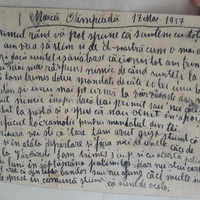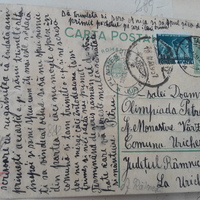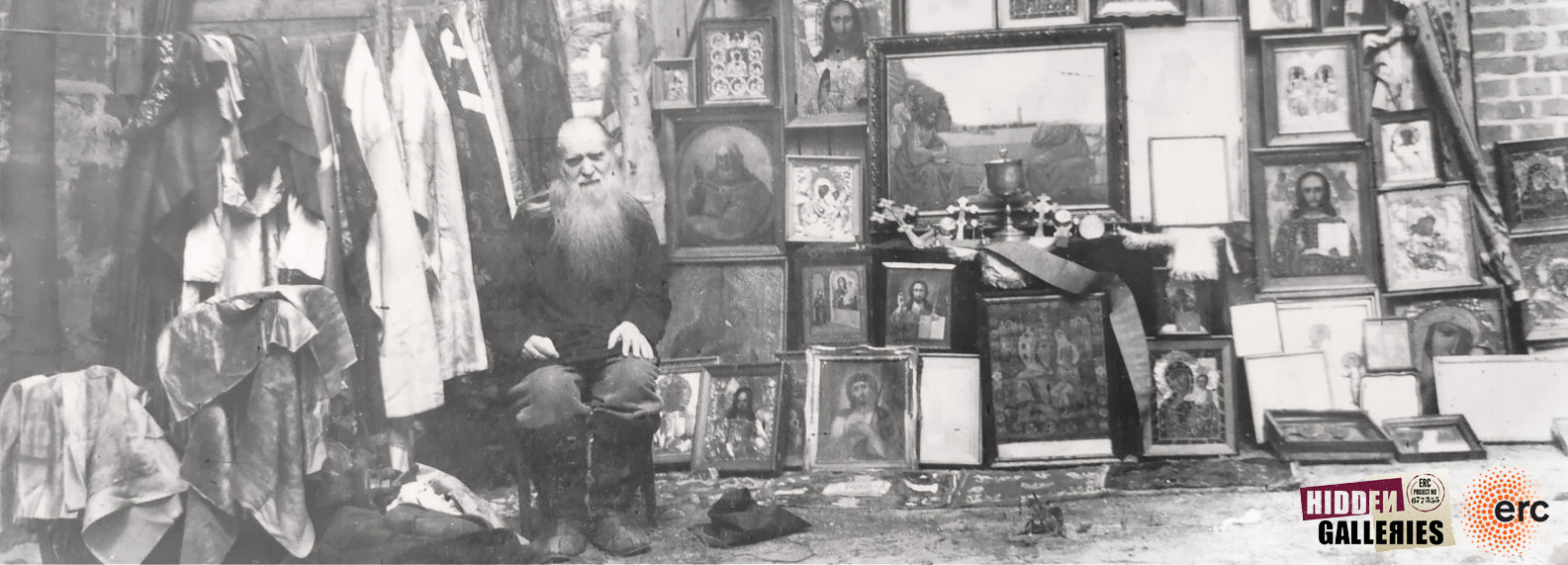Postcard sent to nun Olimpiada Petreanu whilst in monastic incarceration
Item
Title
Postcard sent to nun Olimpiada Petreanu whilst in monastic incarceration
Carte poștală trimisă în detenție călugăriței Olimpiada Petreanu
Description
These images show the front and reverse of a postcard that was sent to nun Olimpiada Petreanu by her brother whilst she was incarcerated at Vărzărești Monastery. The postcard is of particular interest as it mentions the difficulties that the families of imprisoned Old Calendarist nuns encountered in their efforts to contact them.
The first image shows the front of the postcard and contains references to one of the most important issues that the nuns and their families experienced. One of the constant complaints of the nuns, as well as of their families, was that the postcards, letters and packages often went missing or were delivered late. Olimpiada Petreanu’s brother expresses his concern about the fact that their communication was made difficult by unknown causes: “we sent you many letters but you have not responded since you arrived at Vărzărești [...] we asked at the post office but they said that there was nothing for us, so we made a complaint [...] I don’t know the reason for this, maybe because of the lack of money, but many letters are not sent, they stop them.” Similar concerns are expressed by other nuns’ family members in their letters and this continuous state of confusion seems to have been intentionally maintained by the authorities entrusted with the incarcerated nuns supervision. By controlling every package and letter the nuns and their families received, the authorities hoped to destroy the nuns’ will to resist the religious calendar reform and with it undermine the entire Old Calendarist movement. Moreover, we learn from similar correspondence that the lack of communication triggered a fear of abandonment, of having been forgotten and a struggle to come to terms with a difficult situation.
The second image shows the back of the postcard. It contains important information about nun Olimpiada, namely that she had a problem with one of her eyes, as her brother asks her if her eye had healed; from other postcards we learn that she had partially lost sight in her right eye. On the upper edge of the back of the postcard her brother wrote a note asking her about a certain nun Anica and if she had received her packages. This note demonstrates that such events were not isolated and that other Old Calendarist nuns and their families suffered due to the fact that communication was rendered difficult.
Written in 1937, this postcard is important proof of the waves of arrests that followed the so-called "rebellions" in Besserabia, in 1936. Many Old Calendarist nuns were sent to detention where they suffered numerous hardships, hunger and cold. Vărzărești Monastery was one of the main places where Old Calendarist nuns were brought and, according to some Old Calendarist literature, they were forced to accept the New Calendar there. The intimate and private lives of the nuns in detention revealed by these postcards contrasts sharply with the way they were portrayed in the press of the time as dangerous and rebels.
These images can be found in the file ANIC, Insp. Gen. al Jand., D 23/1937. Apart from this postcard, this file contains many more letters and postcards sent or received by Old Calendarist nuns that were detained at various Orthodox Monasteries.
For related entries see:
The first image shows the front of the postcard and contains references to one of the most important issues that the nuns and their families experienced. One of the constant complaints of the nuns, as well as of their families, was that the postcards, letters and packages often went missing or were delivered late. Olimpiada Petreanu’s brother expresses his concern about the fact that their communication was made difficult by unknown causes: “we sent you many letters but you have not responded since you arrived at Vărzărești [...] we asked at the post office but they said that there was nothing for us, so we made a complaint [...] I don’t know the reason for this, maybe because of the lack of money, but many letters are not sent, they stop them.” Similar concerns are expressed by other nuns’ family members in their letters and this continuous state of confusion seems to have been intentionally maintained by the authorities entrusted with the incarcerated nuns supervision. By controlling every package and letter the nuns and their families received, the authorities hoped to destroy the nuns’ will to resist the religious calendar reform and with it undermine the entire Old Calendarist movement. Moreover, we learn from similar correspondence that the lack of communication triggered a fear of abandonment, of having been forgotten and a struggle to come to terms with a difficult situation.
The second image shows the back of the postcard. It contains important information about nun Olimpiada, namely that she had a problem with one of her eyes, as her brother asks her if her eye had healed; from other postcards we learn that she had partially lost sight in her right eye. On the upper edge of the back of the postcard her brother wrote a note asking her about a certain nun Anica and if she had received her packages. This note demonstrates that such events were not isolated and that other Old Calendarist nuns and their families suffered due to the fact that communication was rendered difficult.
Written in 1937, this postcard is important proof of the waves of arrests that followed the so-called "rebellions" in Besserabia, in 1936. Many Old Calendarist nuns were sent to detention where they suffered numerous hardships, hunger and cold. Vărzărești Monastery was one of the main places where Old Calendarist nuns were brought and, according to some Old Calendarist literature, they were forced to accept the New Calendar there. The intimate and private lives of the nuns in detention revealed by these postcards contrasts sharply with the way they were portrayed in the press of the time as dangerous and rebels.
These images can be found in the file ANIC, Insp. Gen. al Jand., D 23/1937. Apart from this postcard, this file contains many more letters and postcards sent or received by Old Calendarist nuns that were detained at various Orthodox Monasteries.
For related entries see:
Aceste imagini prezintă fața și reversul unei cărți poștale ce a fost trimisă călugăriței Olimpiada Petreanu de către fratele ei, în timp ce aceasta se afla în detenție la Mănăstirea Vărzărești. Această carte poștală este de o deosebită importanță întrucât menționează dificultățile pe care familiile călugărițelor închise le întâmpinau în efortul lor de a lua legătura cu acestea.
Prima imagine prezintă fața cărții poștale și face referire la una dintre cele mai mari probleme întâmpinate de călugărițe și familiile lor. Călugărițele și rudele acestora se plângeau adesea de faptul că scrisorile, cărțile poștale, precum și pachetele trimise dispăreau, sau ajungeau cu întârziere la destinație. Fratele călugăriței Olimpiada Petreanu își exprimă îngrijorarea cu privire la faptul că, din motive necunoscute, comunicarea dintre ei era îngreunată: „noi tot am trimis la scrisori și încă nu ai mai răspuns nimic de când sunteți la Vărzărești […] Noi am întrebat la poștă și a spus că n-au venit înapoi și acum am făcut reclamație pentru mandatul dintâi […] dar nu știu care a fost cazul cred că din lipsa banilor sau nu ajung căci multe nu merg, le opresc în comună știind că sunt de acolo.” Îngrijorări similare sunt exprimate și de familiile celorlalte călugărițe în scrisorile pe care le trimit, iar această stare continuă de confuzie pare să fi fost menținută în mod intenționat de către autoritățile încredințate cu asigurarea supravegherii călugărițelor închise. Controlând fiecare pachet și scrisoare pe care călugărițele le primeau, autoritățile sperau să distrugă voința acestora de a se opune noului calendar și, odată cu aceasta, și existența comunității vechi calendariste. Lipsa comunicării genera în ele teama că au fost uitate, abandonate, și lăsate să se confrunte singure cu greutățile unei situații atât de dificile.
Cea de a doua imagine prezintă reversul cărții poștale. Acesta conține informații importante despre călugărița Olimpiada, anume faptul că avea o problemă de vedere la unul dintre ochi, deoarece fratele său o întreabă dacă ochiul i s-a vindecat; din alte cărți poștale aflăm că își pierduse parțial vederea la ochiul drept. În colțul din dreapta al cărții poștale fratele său a scris o notiță în care o întreabă despre o anumită călugăriță Anica, și dacă aceasta a primit pachetele sale. Notița dovedește faptul că aceste evenimente nu erau izolate și multe alte călugărițe, împreună cu familiile lor, erau afectate de comunicarea îngreunată. Scrisă în anul 1937, această carte poștală este dovada valurilor de arestări ce au urmat așa ziselor „rebeliuni” din Basarabia, în 1936. Numeroase călugărițe vechi calendariste au fost trimise în detenție, unde au suferit greutăți, foamete și frig. Mănăstirea Vărzărești a fost una dintre locațiile principale în care călugărițele vechi calendariste au fost închise și, conform literaturii Bisericii Ortodoxe Române de Stil Vechi, au fost forțate să accepte noul calendar. Aspectele intime și private din viețile călugărițelor ce sunt reflectate în aceste cărți poștale vin în contradicție cu modul în care erau prezentate de presa timpului, drept promiscue și rebele.
Aceste imagini se găsesc în ANIC, dosarul Insp. Gen. al Jand., D 23/1937. Pe lângă aceste cărți poștale, dosarul conține multe alte scrisori și cărți poștale primite sau trimise de către călugărițele vechi calendariste aflate în detenție în mănăstirile ortodoxe.
Pentru descrieri similare vezi:
Prima imagine prezintă fața cărții poștale și face referire la una dintre cele mai mari probleme întâmpinate de călugărițe și familiile lor. Călugărițele și rudele acestora se plângeau adesea de faptul că scrisorile, cărțile poștale, precum și pachetele trimise dispăreau, sau ajungeau cu întârziere la destinație. Fratele călugăriței Olimpiada Petreanu își exprimă îngrijorarea cu privire la faptul că, din motive necunoscute, comunicarea dintre ei era îngreunată: „noi tot am trimis la scrisori și încă nu ai mai răspuns nimic de când sunteți la Vărzărești […] Noi am întrebat la poștă și a spus că n-au venit înapoi și acum am făcut reclamație pentru mandatul dintâi […] dar nu știu care a fost cazul cred că din lipsa banilor sau nu ajung căci multe nu merg, le opresc în comună știind că sunt de acolo.” Îngrijorări similare sunt exprimate și de familiile celorlalte călugărițe în scrisorile pe care le trimit, iar această stare continuă de confuzie pare să fi fost menținută în mod intenționat de către autoritățile încredințate cu asigurarea supravegherii călugărițelor închise. Controlând fiecare pachet și scrisoare pe care călugărițele le primeau, autoritățile sperau să distrugă voința acestora de a se opune noului calendar și, odată cu aceasta, și existența comunității vechi calendariste. Lipsa comunicării genera în ele teama că au fost uitate, abandonate, și lăsate să se confrunte singure cu greutățile unei situații atât de dificile.
Cea de a doua imagine prezintă reversul cărții poștale. Acesta conține informații importante despre călugărița Olimpiada, anume faptul că avea o problemă de vedere la unul dintre ochi, deoarece fratele său o întreabă dacă ochiul i s-a vindecat; din alte cărți poștale aflăm că își pierduse parțial vederea la ochiul drept. În colțul din dreapta al cărții poștale fratele său a scris o notiță în care o întreabă despre o anumită călugăriță Anica, și dacă aceasta a primit pachetele sale. Notița dovedește faptul că aceste evenimente nu erau izolate și multe alte călugărițe, împreună cu familiile lor, erau afectate de comunicarea îngreunată. Scrisă în anul 1937, această carte poștală este dovada valurilor de arestări ce au urmat așa ziselor „rebeliuni” din Basarabia, în 1936. Numeroase călugărițe vechi calendariste au fost trimise în detenție, unde au suferit greutăți, foamete și frig. Mănăstirea Vărzărești a fost una dintre locațiile principale în care călugărițele vechi calendariste au fost închise și, conform literaturii Bisericii Ortodoxe Române de Stil Vechi, au fost forțate să accepte noul calendar. Aspectele intime și private din viețile călugărițelor ce sunt reflectate în aceste cărți poștale vin în contradicție cu modul în care erau prezentate de presa timpului, drept promiscue și rebele.
Aceste imagini se găsesc în ANIC, dosarul Insp. Gen. al Jand., D 23/1937. Pe lângă aceste cărți poștale, dosarul conține multe alte scrisori și cărți poștale primite sau trimise de către călugărițele vechi calendariste aflate în detenție în mănăstirile ortodoxe.
Pentru descrieri similare vezi:
Subject
Religion and State--Europe
Religion -- History -- 20th century
Religion and Politics-- Europe
Secret police (secret service)
Nationalism--Romania--History
Monastic and religious life of women
Surveillance
Romania. Siguranța
Communism and Christianity
Communism and Christianity--Europe, Eastern
Communism and religion
Communism--Europe
Communism--Europe--History
Communism--Europe--History--20th century
Communism--Europe, Eastern
Communism--Europe, Eastern--History--20th century
Communism--History--20th century
Spies
Totalitarianism
Material culture--Religious aspects
Religious groups
Creator
Iuliana Cindrea
Source
Arhivele Naționale ale României
Inspectoratul General al Jandarmeriei, D 23/1937
Inspectoratul General al Jandarmeriei, D 23/1937
Publisher
This project has received funding from the European Research Council (ERC) under the European Union’s Horizon 2020 research and innovation programme No . 677355
Date
1937
Rights
Copyright for these images belongs to ANIC
Arhivele Naționale ale României
Arhivele Naționale ale României
Format
Image/ jpg
Photo
Photo
Language
RO
Type
Image
Identifier
ANIC, Inspectoratul General al Jandarmeriei, D 23/1937
Coverage
20th Century, Romania
Bibliographic Citation
Iuliana Cindrea, "Postcard sent to nun Olimpiada Petreanu whilst in monastic incarceration"
Date Created
2020
 Postcard sent to nun Olimpiada Petreanu whilst in detention
Postcard sent to nun Olimpiada Petreanu whilst in detention  Reverse of the postcard sent to nun Olimpiada Petreanu
Reverse of the postcard sent to nun Olimpiada Petreanu 